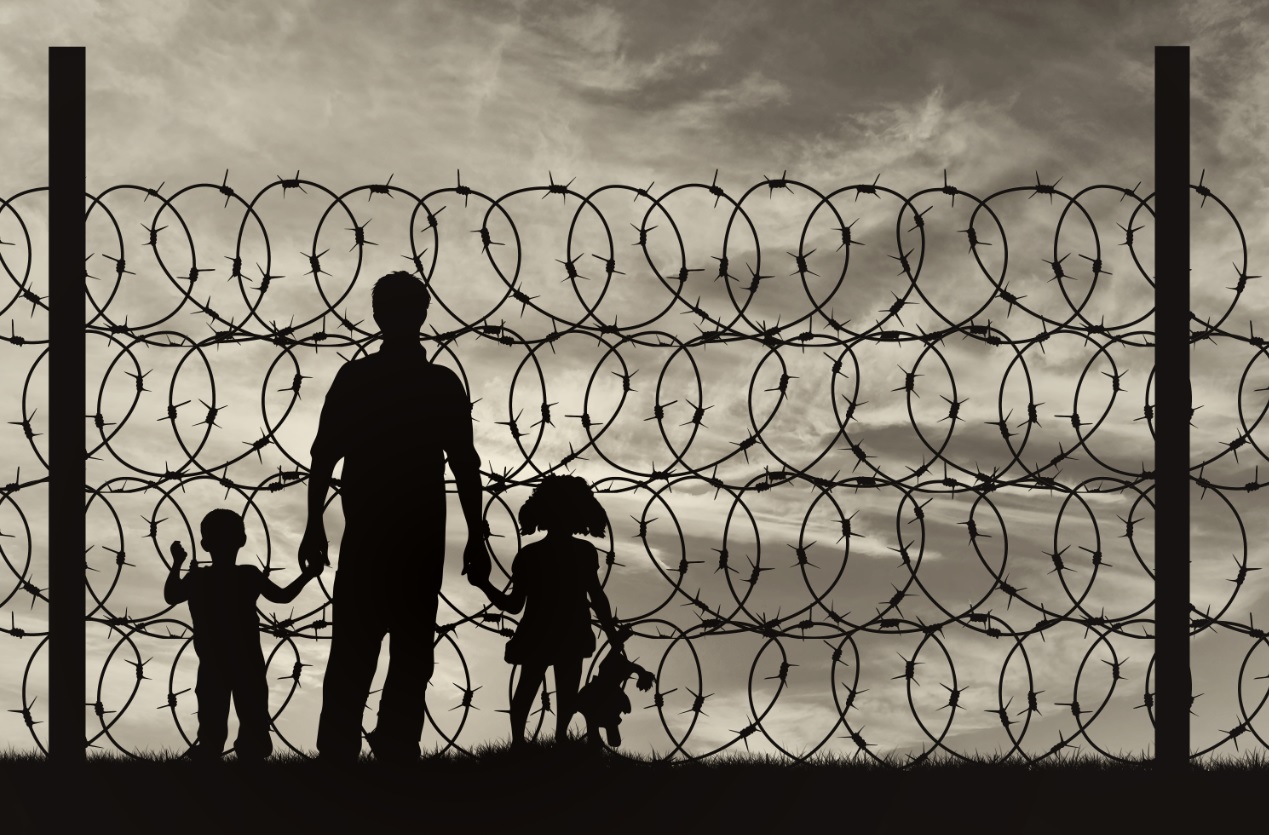Barbed Wilderness
– Fiction by Natalia Hrycay –
Honourable Mention in the Dreamers 2021 Stories of Migration, Sense of Place and Home Contest

He’s tired of feeling like a criminal. He’s tired of being in a country that needed him, needed his people, but didn’t want their kind. He’s tired of the effort it takes to push away the knowledge that he is wrongfully interned in this Canadian prisoner’s camp. The land he had worked on for two years is sitting idle, the house he put together piece by piece, empty; everything seized by the government. Instead of Olesya knocking back dough on the kitchen table he built and picking blueberries by the meadow with little Mykola tied to her side, they are here, interned with him. How easily freedom is taken for granted. What you think is a basic right gets twisted in times of war. Enemy aliens, such foreign words to him, yet the utterance screams of notions of traitor, foe, menace and disgust. The country that asked him to come and help build its land was now protecting its people from his family. He – a man who had never lifted a hand against anyone; Olesya, to whom he could not explain the meaning of the 1914 War Measures Act and how it related to them and their 10-month old infant.
Every day they stare through the barbed wire at the mountains, the ones they’ll never see up close, the ones they’ll never climb. Mountains which will be littered in coming times with hikers from all over the world, stopping to take in the sweeping views of the Canadian wilderness; ignorant of the fact that hundreds of innocent prisoners had once looked onto where they now stand. They will squirt water from their bottles to quench their thirst, snap pictures with their cameras, crunch on granola bars they pulled out of their backpacks. They will know nothing of the bitter cold of winters, of the 12-hour days of labour while sinking thigh-deep in snow, clothes frozen like cardboard. They will know nothing of the smell of sickness filling the barracks and the meagre food in half-filled bellies. They will not be told for a long time who cleared the bush, carved the mountainside and built the roads they navigated to get to the trailhead.
It was bad enough when he first registered for his identity papers. He dreaded that one day each month when he had to present himself to the local police station. Lined up in a queue with all the other men as locals walked by sneering, spitting, some even throwing rocks at them as the months passed, and the war continued. There he stood, head down, avoiding eye contact, trying to disappear. Disappear into the earth he toiled daily, the only place he felt at home. The shame of the immigrant; an accumulation of months in a foreign land. What had been natural their entire life suddenly reversed upon arrival. The warped sounds of their mother tongue, the offensive smell of their food, their primitive way of dressing, their unsophisticated manner. Belittled, ridiculed, scorned. He could barely remember being a local; a simple citizen. As if his body was a puzzle and the pieces had been shifted around, parts of him displaced.
Then it started happening; men being detained and sent away. His turn came soon enough. The knock at the door, the officers in red coats and tall boots, the fear creeping up his spine. They had done nothing wrong. The added humiliation of being arrested, his family taken, the farm he had broken his back building, seized. Upon arrival; pockets emptied, wedding rings wrenched off shaking fingers, his gold cross – the only memory of his father, unclipped, never to be seen again.
The fall turned into winter and then, impossibly, the next winter came, as cold as the first. He thought they would have been released by then, but they remain behind the barbed wire. The days repeat themselves. Every morning he slips from his cot, fighting the chill of winter as he layers his clothes, the pain in his spine building along the full days of back-breaking work, the numbness in his hands mounting his fear as he tries not to lose grip of his saw, minute after minute, hour after hour. Every day, he continues his inner battle of pushing away thoughts of what was left behind; the chickens in his yard, the additional land he would have cleared by now, the crops that could have been, the crops that never were. He sets the goal of one day; to make it through one day, to make it to the doorway where Olesya always waits for him, her face awash with worry, quickly removing his dirty-wet clothing, rubbing life into his muscles, feeding love into his loss. He thinks of the interned bachelors who have toiled all day and come back to emptiness. He thanks the Lord for his blessings.
Then the moment they had all been waiting for arrives. After 794 days, they are free to go. Little do they know, there is no longer anywhere to go. Their land has been repossessed; another family sleeps in their bedroom, cooks in their kitchen, eats from their garden. It is almost too much to bear, but the years have made them strong. They have done it once, they must do it again.
And they succeed.
Sixty years later, Olesya long gone, he sits in his apartment staring across the kitchen table at his son and his grandson. What he had chosen to forget, what he thought he could keep from resurfacing, has now spilled out like backed up sewage.
“Why didn’t you ever say anything?” Mykola asks.
“It was not a pleasant time, it was not something your mother and I wanted to remember.”
“But what about your rights? You came to Canada for a better life, and instead you were imprisoned,” says Borys.
He smiles at his grandson, still in disbelief that he is no longer a child but a married man running the family farm better than he ever could. Graduated from university with his business degree and ideas he never would have imagined! Mykola thought he would work in some office, but he knew Borys loved the land too much to sit behind a desk. The young ones, he thinks, this new generation possesses the arrogance for demanding justice, acknowledgment and apology. They are not immigrants.
“Had I stayed in Galicia, life would have been worse. I would have died in the Great War or remained a poor peasant. And my children would have been poor peasants, and now you would be a poor peasant.”
He watches as Borys tightens his lips, he has seen that frustration before on his grandson’s face but has never been the cause of it. He can barely hear Borys add, “You don’t know that.”
“I do know that,” he answers loud and clear.
“You were a civilian, you had no part in the war,” his son says gently. Silence fills the space between them.
“People get suspicious, people get scared, people acting on fear make bad decisions,” he says. He has thought of this before, has had similar arguments with himself inside his head.
“It can be about honouring your experience, revealing what happened, assuring that it won’t happen again.”
“It won’t.”
“But it did, it happened again to the Japanese during the Second World War!” He can tell Borys won’t let go of the issue. “They’ve even tried to deny it, documents were thrown out, facts were tossed aside. They know what they did was wrong!”
He thinks back and knows their fear had not been without memory.
“We were terrified of being imprisoned again, we were thankful to be out, thankful for the opportunity of a normal life! No, it’s just the way it was. We were happy to be able to work, to be able to eat. We welcomed the chance to start over with both hands and a full heart. And look now. I’m proud to say I helped build Canada, we are worthy of what we have achieved, and I love this country. You have the farm, the house, the tractors, 300 acres of land. Think of how many mouths we’ve helped feed over the years with what we’ve produced. I have two children with university degrees, four grand-children and a great grand-child on the way. The future is more beautiful than I ever could have imagined. There’s no point in re-hashing the past, bringing all that pain to the surface. It’s already dead and buried.”
He’s thankful Olesya is not here for this discussion. Raising an infant in the camps had crushed her heart. The stress and poor nutrition had dried up her breast milk within weeks of their arrival. How she pleaded with the guards to find her some milk. The memory and the helplessness so long ago forgotten suddenly fill him. He feels the heat rise to his face.
“You were locked up and branded a POW,” Borys says, taking up the argument.
“I was not a POW.”
“Yes, you were. That is how you were filed on documents – a POW.”
“Well, I wasn’t. We knew that, the guards knew that, I’m sure the government knew that.” He feels the beginning of a headache at his temples.
“Did you know there were over 20 such internment camps across Canada?” Borys says.
He didn’t know there were so many, could not imagine more than 20 camps filled with men, women, children going through what they went through. He had never wondered much about similar places beyond his own barbed fence.
“The Ukrainian Canadian Congress is putting time into researching all this information. You could be of great help.”
His fist comes down hard on the table, rattling the cups of coffee. The surprise on their faces equals his own. He has always been a gentle man.
“Enough.” The finality of the word falls from his mouth like iron.
***
Twenty-eight years later, The Internment of Persons of Ukrainian Origin Recognition Act passes in Canada. Borys stands at the ceremony and for the first time in a long time, he feels peace come over him when thinking about what happened to his grandfather. Is this what he has needed all these years? Just a simple recognition? Would it have made a difference to his
grandfather? He wishes he could witness this day, but he’s been gone for over 25 years. He had remained adamant about leaving the past in the past. He is surprised by the tears that well in his eyes and the tightness in his throat. He looks at the people in attendance and feels oddly proud to be Canadian. When he had first found out about what had passed, he could not believe it had happened in his beautiful country. But now, this honouring of the memory of those who had suffered, the honouring of history, has made him come full circle.
He has finally come back home.
About the Author – Natalia Hrycay

Natalia Hrycay currently lives in Montreal with her husband and two children. Her earliest childhood memories were the vibrant fairy tales her grandmother recounted at bedtime. Her love of stories quickly turned into a love of the written word. Natalia pursued her interest in language and graduated with an M.Sc. in Speech-Language Pathology from McGill University. She is currently working on her first fiction novel inspired by her family’s history during and after WWII.
Did you like this story by Natalia Hrycay? Then you might also like:
Someone to Watch My Back
Pieces of You
Prepared
Delete.
**This story by Natalia Hrycay received an Honourable Mention in the 2021 Stories of Migration, Sense of Place & Home Contest.
To check out all the fiction available on Dreamers, visit our fierce fiction section.
Like reading print publications? Consider subscribing to the Dreamers Magazine!